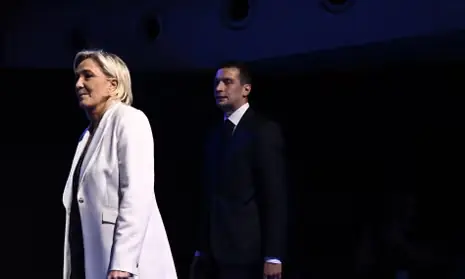
As France braces for its upcoming snap elections scheduled for June 30 and July 7, the political landscape appears increasingly fragmented and uncertain.
According to the latest Ipsos polling data conducted for Le Monde and several other prominent institutions, the far-right bloc, led by Marine Le Pen’s Rassemblement National (RN), is poised to dominate the polls with a commanding lead.
The survey, conducted online with a robust sample of 11,820 respondents, paints a picture of heightened voter engagement, anticipating a turnout between 61% and 65%. This contrasts sharply with the lackluster participation recorded in previous legislative elections, underscoring the significance of these upcoming polls.
As of the latest survey results, the RN commands a substantial 32% of voting intentions, maintaining a consistent lead similar to their performance in the recent European elections.
This figure climbs further to 36% when including candidates from Les Républicains (LR), who have formed an electoral alliance with the RN under the leadership of Eric Ciotti.
This collaboration underscores a strategic shift within the right-wing political spectrum, positioning itself as a formidable contender against traditional centrist and left-wing parties.
In stark contrast, President Emmanuel Macron’s coalition, which has seen diminishing popularity since the European elections, trails significantly behind with only 14.6% of the vote share.
This development reflects a broader discontentment among voters, exacerbated by economic uncertainties and political disillusionment with the current administration.
The left-wing opposition, united under the Nouveau Front Populaire (NFP), presents a consolidated front against the rising tide of the far-right and center-right alliances.
However, their combined efforts face an uphill battle against the entrenched positions of the RN and its allies, as reflected in the survey’s findings.
The upcoming elections, precipitated by President Macron following the European elections, have emerged as a critical juncture for French politics.
With public sentiment deeply divided among competing ideological blocs, ranging from nationalist fervor to progressive aspirations, the outcome of these elections holds profound implications for the future direction of France’s domestic policies and its role within the broader European Union framework.
As the countdown to polling day continues, analysts and voters alike remain gripped by the uncertain outcome, oscillating between fear, hope, and anticipation.
The dynamics of this electoral contest underscore not only the resilience of populist sentiments but also the evolving strategies of political alliances seeking to capitalize on shifting voter allegiances.
With just days remaining before the first round of voting commences, all eyes are on France as it navigates a pivotal electoral moment that promises to redefine its political landscape for years to come.
This article was created using automation technology and was thoroughly edited and fact-checked by one of our editorial staff members